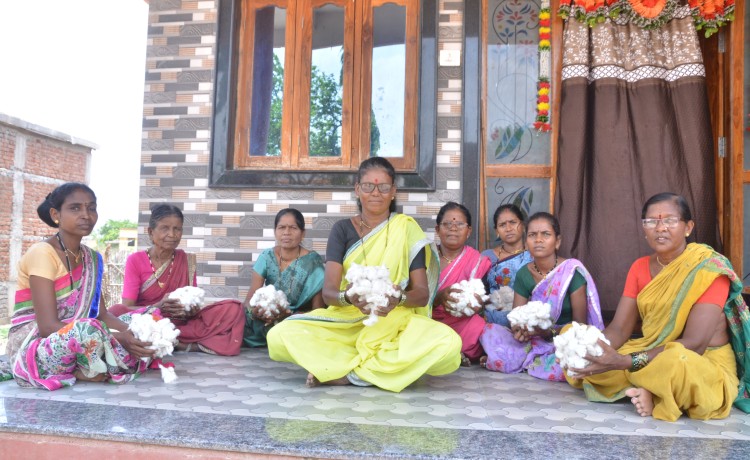In the heart of Chandrapur’s Rajura block lies Devada, a quiet farming village where cotton reigns supreme. With 264 of its 298 households cultivating over 2200 acres, agriculture is more than a livelihood—it’s a way of life. But it was defined by outdated practices, limited tools and little access to credit. Women worked on farms but had little say in finances till Ambuja Foundation intervened. Under its guidance, these women now are decision makers, negotiators, and entrepreneurs.
Against this backdrop, the women of the Rani Durgavati Mahila SHG have started quietly building an empire—season by season, piece by piece - they have moved from only saving, to prosperity!
1. From Saving to Savvy - Formed in 2002 by 12 Gond women, the SHG began with savings of just Rs.20 per member. In 2022, Ambuja Foundation began training them in financial literacy, agri-business and modern farming techniques. The tribal women, once shy and reserved, are now decision makers, negotiators, and entrepreneurs.
2. Collective Cotton Procurement – With guidance from Ambuja Foundation, the SHG took a bold step into collective cotton procurement. Using basic tools like weighing machines and tarpaulin, they gathered 105 quintals over three cotton seasons, sold directly to ginners, and turned last year’s loss into this year’s profit by Rs. 12,500. In 2024-25, their target was 300 quintals. Crucially, the women now negotiate directly with ginners—gaining confidence and control.
3. Bio-Inputs Production - To reduce chemical use, they began making and selling natural crop protectors like Dashparni and Nimboli decoctions. In 2023, they sold 1000 litres and earned Rs. 50,000—while saving thousands in agri-input costs, by using the same on their fields. “We used to spend Rs. 10,000 – Rs. 15,000 average, on chemicals for our farms. Now, we make our own—and breathe easier.” The practice promotes long-term soil health and ecological balance which reduces toxic load.
4. Flour Milling – With the support of the Maharashtra government’s women development corporation, MAVIM (Mahila Arthik Vikas Mahamandal), a flour mill worth Rs.75,000 was set-up and the SHG contributed Rs. 7500. It now generates Rs. 150–Rs. 200 daily, and reduces villagers’ need to travel for flour—saving both time and money.
5. Farm Machinery Bank - In partnership with Ambuja Foundation and the Agriculture Department, the SHG helped establish a Rs.6,75,000 farm machinery bank. With reapers, seed drills, cultivators, and bed-making machines, they cut manual labour and raised productivity. One bed-making machine alone earned Rs. 30,000 by covering 10 acres.
Today, the SHG sees an annual turnover of Rs.2,50,000 - reinvested into a growing loan fund for members. But the bigger change is cultural. Women who once stayed behind closed doors now run machines, negotiate with traders, and contribute to shaping the local economy. Some are first-time earners. All are leaders.
The story of the Rani Durgavati Mahila SHG is one of steady, layered progress. With the right support and their own hard work, these women have transformed a savings group into a thriving rural enterprise.


